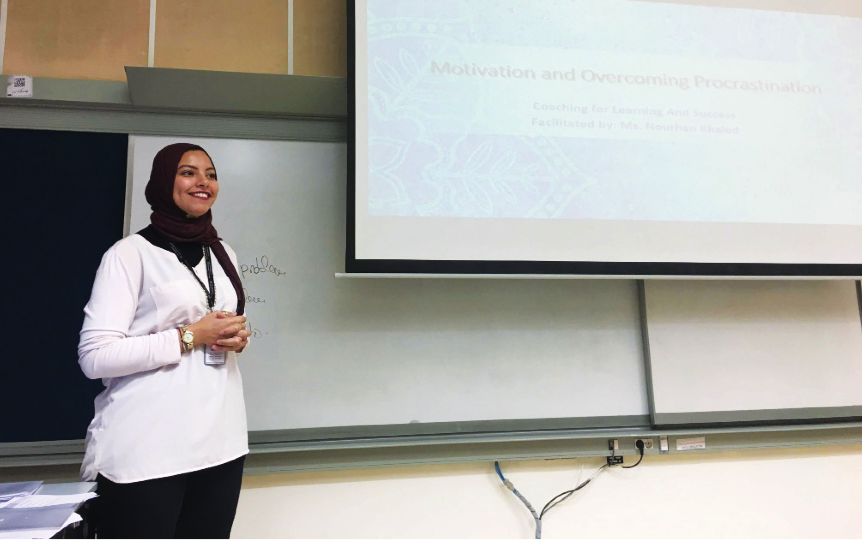Procrastination Takes a Toll on AUCians’ Academic Performance
The library is overflowing, even the often abandoned third floor, as students skip classes to study and work on other courses. Every midterm period is the same story – students rushing to cram a month’s worth of work within hours.
“Procrastination is the result of us not valuing our time,” says part-time Academic Counselor at the Office of Student Well-being Nourhan Khaled.
Khaled hosted the Motivation and Overcoming Procrastination workshop held by the Office of Student Well-being on October 24.
She said that one of the main reasons for students to delay their work is that they keep deceiving themselves, saying they are going to ‘do it soon’, which turns into later.
“Procrastination is about lying to yourself,” Khaled explained.
In order to stop procrastinating, students must understand why they act the way they do.
“Procrastination has always been a major issue for me. I could be doing much better in a lot of my courses if I had better time management skills,” said Karim Mohamed, a junior mechanical engineering student.
Mohamed explained that his procrastination affects the quality of his work when he crams everything at the last minute to meet the deadline.
Procrastinators often keep putting off their work until they cross the action-line. The action-line is what separates doing something while relaxed and with time to spare, and waiting until a few hours before the deadline to start working on it.
This does not mean that students do not experience stress and anxiety about their upcoming deadlines. Khaled explains that they just do not have the motivation to act on them, until their anxiety reaches its peak at the action-line. That is when they are faced with the reality of their upcoming deadlines and start rushing to get their work done.
Undeclared freshman Khadija Hafez said, “It is only a few hours before my submission that I am hit with the realization that I need to get my work done.”
“I try to get [the work] done earlier but I always get distracted or side tracked by something more entertaining,” Hafez continued.
If the students become conscious of their educational process and the goal behind each of their assigned tasks, they will find it much easier to get work done ahead of time.
“If you have a reason behind everything, then you are conscious about it so you will not postpone it,” explained Khaled.
Despite knowing the consequences of procrastination and putting work off, students remain hung up on their bad habit.
“We feel stressed, we feel paralyzed,” said Khaled, explaining how procrastination takes over the rational part of the brain.
Khaled believes that students should not complain about their professors putting pressure on them when they are the ones at fault for not managing their time properly.
“When you postpone everything until the last minute, this is your responsibility. It is not because of lack of time but it is because you underestimate the time,” added Khaled.
She explains that managing time can be done by setting a precise schedule, where every task’s timing is carefully calculated, and sticking to it will help the students stay on track and not get distracted by their surroundings.
Journalism and Mass Communication professor Alaa Abdel-Ghani complained about his students’ lack of time management, leading them to perform poorly in his 8:30 class due to lack of sleep.
Abdel-Ghani elaborated, “some students don’t come on time, again because they wake up late, which means they have to work fast which usually doesn’t bring good results. It must also affect their other classes as they day goes on. If it’s just a lecture in these classes, they doze off.”
To put an end to the addictive habit, students should adapt to one of several methods.
Students could apply a benefit-cost analysis. Through this analysis, students can weigh out the advantages and disadvantages of performing a task prior to its deadline rather than hours before its submission.
Another method that students could use to prevent themselves from procrastinating is making a plan and setting goals.
“Arrange your tasks according to importance,” said Khaled.
Khaled also suggested getting help from a friend or family member. If a student procrastinates by spending their time on the internet then they should get someone to change the password until they finish what they have to finish, and the same applies to any source of distraction.
She also explained that students should set rewards for themselves after they accomplish each of their set goals.



